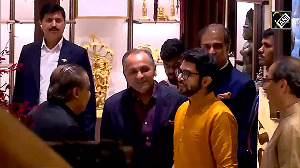'The BJP has taken too much of credit for sweeping urban local elections.'
'It is true in the mayor segment. But in the smaller cities, semi-urban and rural areas, the BJP has done badly and so have the other parties.'
'Nobody can claim they have swept the elections.'
'What Mayawati failed miserably to do in the assembly election, she has managed to gain that in this election.'

'BJP wins big in Uttar Pradesh civic elections', 'BJP secures landslide win in UP civic polls' were some of the headlines splashed across newspapers, television channels and Web sites after the recent local body elections in the state.
Even as the Bharatiya Janata Party celebrated its victory and took it as a sign of things to come in the Gujarat assembly election, some reports clarified that the results demonstrated a considerable waning of the pro-BJP mood.
So, what is it? Do the results indicate a BJP sweep or is there more to the results that political parties aren't seeing?
In an interview to Rediff.com's Syed Firdaus Ashraf, Dr A K Verma, director, Centre for the Study of Society and Politics, Kanpur, demystifies the UP civic body election results and their larger implications.
First it was reported that the BJP swept the elections. Then it emerged that the BJP's victory wasn't all that convincing, and that the non-BJP parties in fact did better. What is the actual picture?
Normally, third tier elections shouldn't and mustn't be compared to second-tier (assembly elections) or even Lok Sabha polls.
The confusion arises because most people are trying to compare the BJP's performance in this poll with that in the assembly election.
This is the first (local body) election in 22 years which has been fought on political lines.
If you compare the performance of all the political parties, then the trend is same.
All the political parties have performed badly.
Nobody can claim they have swept the elections.
It was only the mayoral poll which was more visible and got media attention wherein the BJP did well.
The BJP normally does well in urban centres. So, it was not a surprising result.
But as you go down to the nagar panchayats, you find out that all the political parties have performed very badly.
If you look at the deposit losses, you will find that BJP candidates lost their deposit in 45 per cent of seats, the SP (Samajwadi Party) in 54 per cent of seats, the BSP (Bahujan Samaj Party) in 66 per cent of seats and the Congress in 75 per cent of seats.
We can certainly say that in the mayoral elections the BJP did very well, but as you go down the line, the party has not done well, but it is true for other political parties too.
Why was the outcome bad for political parties whereas Independent candidates did well?
Local elections are never fought on political lines.
This is the first time parties have come out and tried to fight it out on political issues, but this was a very local issue election.
Even if you think of the mayoral candidates, people did not vote on party lines, but on personal lines.
People know mayors personally, so they vote for them.
There is a personal equation between the voter and the candidate.
So can we then say that the reading of the BJP sweeping the UP local elections is wrong?
The BJP has taken too much of credit for sweeping urban local elections. It is true in the mayor segment.
But in the smaller cities, semi-urban and rural areas, the BJP has done badly and so have the other parties.
For example, the BJP won 22 per cent seats in nagar panchayat president elections and got only 12 per cent of votes in nagar panchayat member elections. Polling percentage of all the political parties was bad.

Can we then say that this election result reflects badly on Yogi Adityanath's governance in UP for the last six months?
Yogi did campaign vigorously in this election, but down the line, people don't vote based on the Yogi government's performance because local issues are very different.
Local issues are very petty issues on which people vote. I feel the people have voted on personal lines.
I would not consider this election as a mandate against the Yogi government.
How do you view the last six months of the Yogi government?
I am not greatly impressed, but at the same time, you have to understand that there are very high expectations.
Secondly, Uttar Pradesh is very large; therefore, managing the state is a very tough job.
Unless you have a clear roadmap and blueprint of a development agenda, the benefits will take a lot of time to trickle down.
That is one reason why we need to be patient and give time to Yogi.
How much has the BSP gained in this election?
I think it has done better than the Samajwadi Party in the mayoral elections.
They have snatched two seats from the BJP, and that is Meerut and Aligarh. You can attribute that to the meat lobby who tried to consolidate Muslim votes for the BSP.
Dalits this time have come out in big numbers to back Mayawati.
If you go to central UP, north, the greatest recovery is in south-east UP (the Mirzapur belt).
The BSP has got 22.6 per cent votes there, which is very good. The BSP seems to be doing a little better than the SP.
What about the BSP's non-Jatav voters? Have they returned to Mayawati's fold?
We do not have that data now, but certainly, Dalit consolidation has happened in this election.
Not only Dalit consolidation, but social engineering with Muslims too has happened this time.
What Mayawati failed miserably to do in the assembly election, she has managed to gain that in this election.










